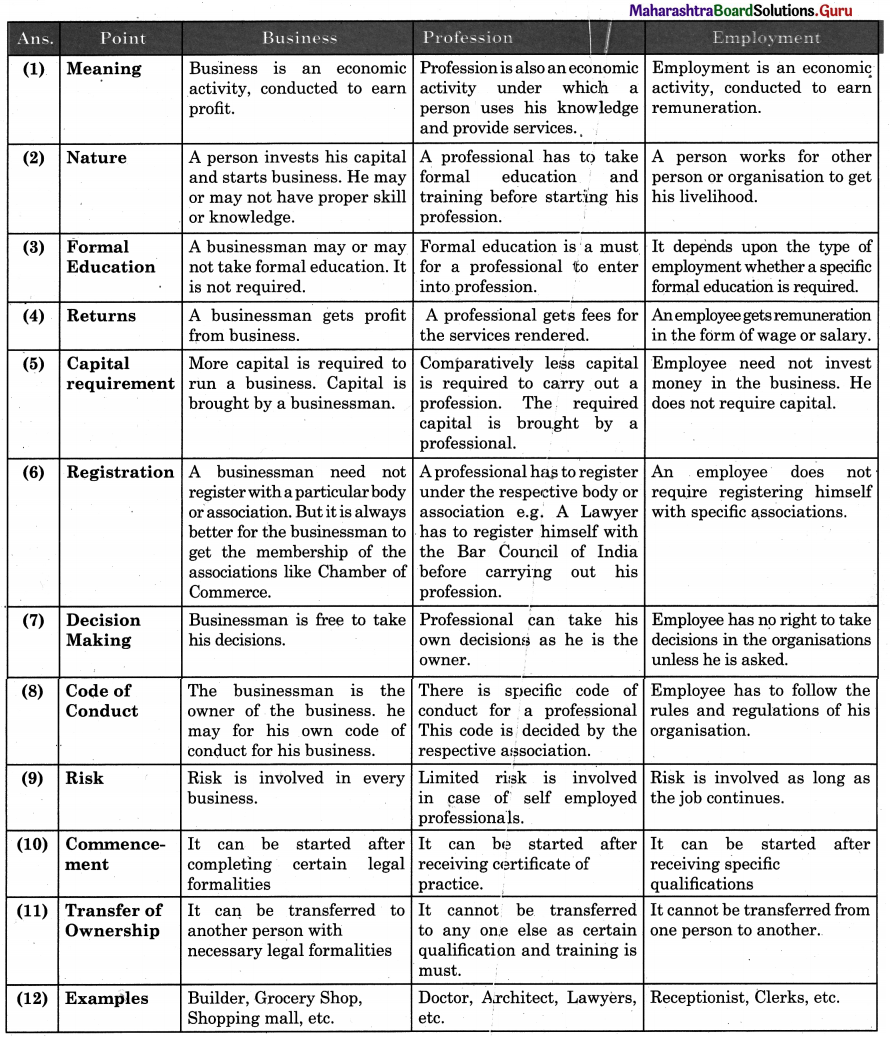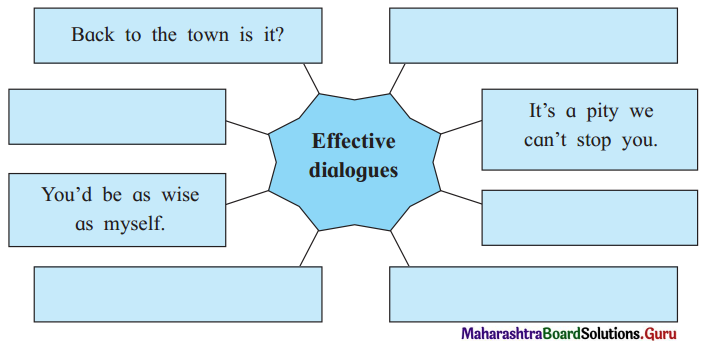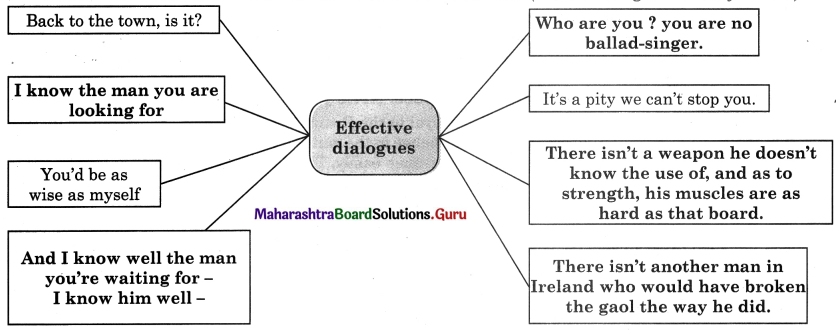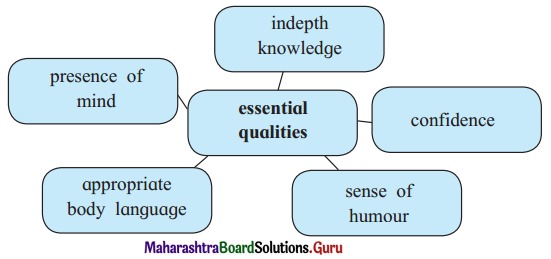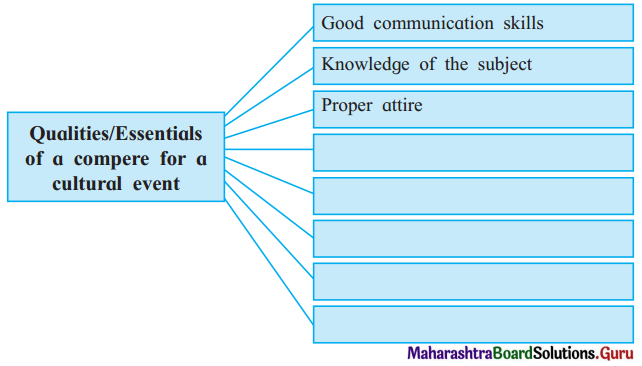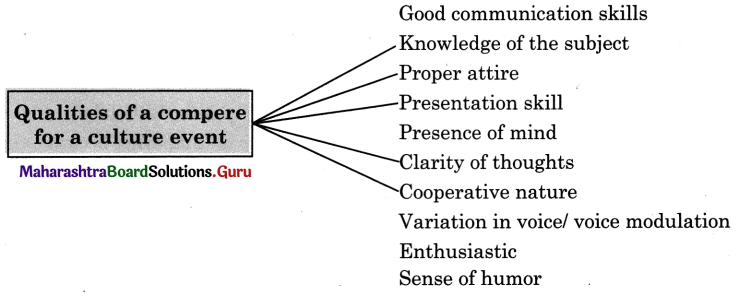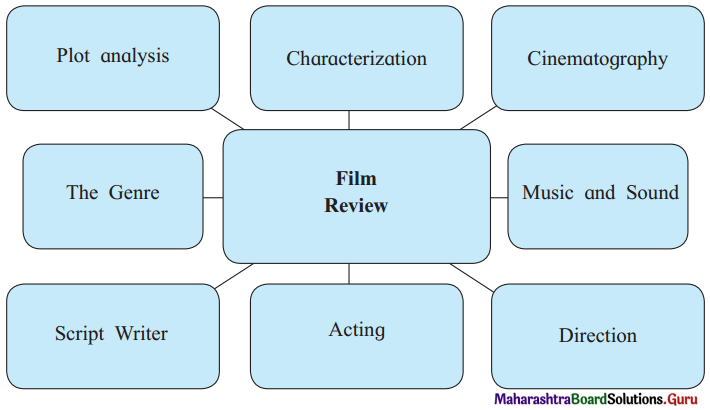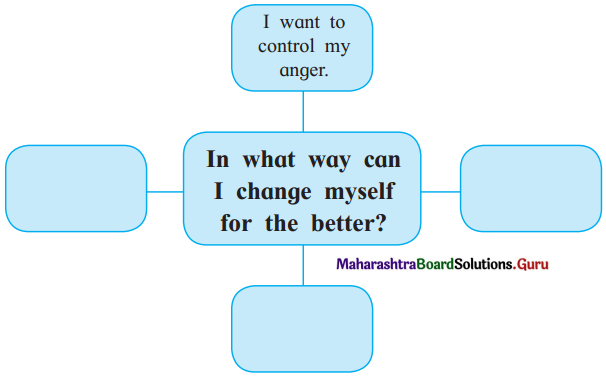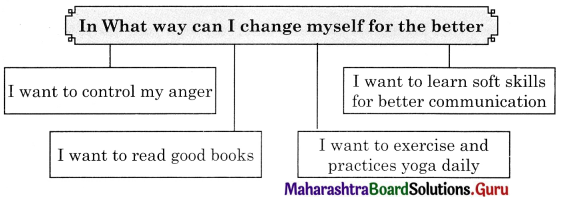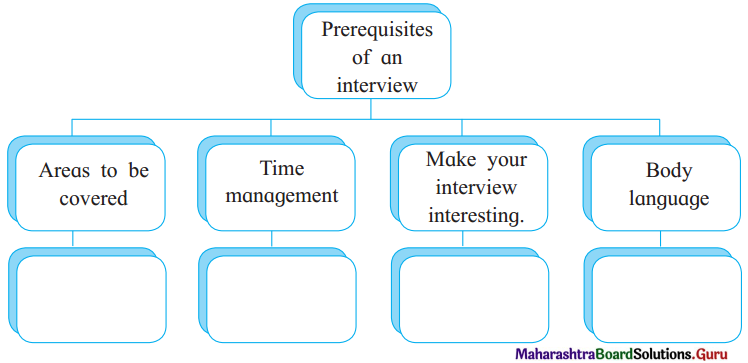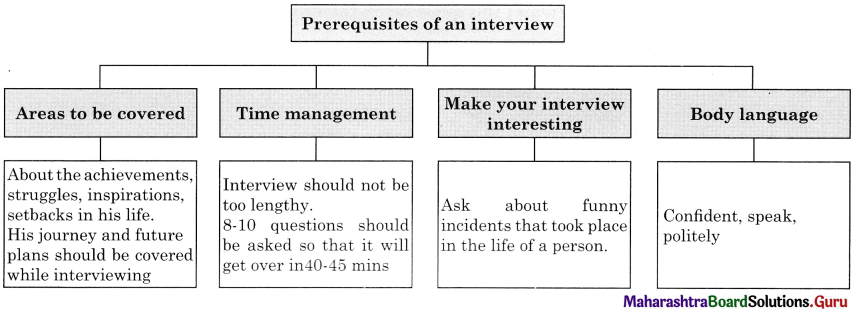Balbharti Maharashtra State Board Class 11 Secretarial Practice Solutions Chapter 1 Secretary Textbook Exercise Questions and Answers.
Maharashtra State Board Class 11 Secretarial Practice Solutions Chapter 1 Secretary
1A. Select the correct answer from the options given below and rewrite the statements.
Question 1.
The word Secretary is derived from the Latin word ____________ which means a confidential writer.
(a) Amatya
(b) Scribae
(c) Secretarius
Answer:
(c) Secretarius
Question 2.
Only ____________ can be appointed as a Secretary.
(a) an Individual
(b) a Partnership firm
(c) a Joint-stock company
Answer:
(a) an individual
![]()
Question 3.
A Secretary is a custodian of ____________ information.
(a) confidential
(b) individual
(c) investigative
Answer:
(a) confidential
Question 4.
The Secretary of a Joint-stock company should be a member of ____________
(a) IPS
(b) ICSI
(c) IAS
Answer:
(b) ICSI
Question 5.
____________ is the oldest type of Secretary.
(a) Company Secretary
(b) Personal Secretary
(c) Secretary of Government Department
Answer:
(b) Personal Secretary
Question 6.
The main objective of a co-operative society is to ____________ the interest of its members.
(a) neglect
(b) takeover
(c) protect
Answer:
(c) protect
Question 7.
Secretary of Government department must be a member of the ____________
(a) ICSI
(b) IAS
(c) ICWA
Answer:
(b) IAS
![]()
Question 8.
____________ means correctness in doing a work.
(a) Accuracy
(b) Loyalty
(c) Courteous
Answer:
(a) Accuracy
1B. Match the pairs.
Question 1.
| Group ‘A’ | Group ‘B’ |
| (a) Amatya | (1) Government department |
| (b) Ministry of Finance | (2) Paid employee |
| (c) Personal Secretary | (3) Appointed by busy persons |
| (d) Loyalty | (4) Roman Empire |
| (e) Financial duties | (5) Maintenance of books of accounts |
| (f) Secretary | (6) Faithfulness |
| (7) Reveals information | |
| (8) Appointed by Co-operative societies | |
| (9) Ancient Indian history | |
| (10) Correspondence | |
| (11) Free service | |
| (12) Joint Stock company |
Answer:
| Group ‘A’ | Group ‘B’ |
| (a) Amatya | (9) Ancient Indian history |
| (b) Ministry of Finance | (1) Government department |
| (c) Personal Secretary | (3) Appointed by busy persons |
| (d) Loyalty | (6) Faithfulness |
| (e) Financial duties | (5) Maintenance of books of accounts |
| (f) Secretary | (2) Paid employee |
1C. Write a word or a term or a phrase that can substitute each of the following statements.
Question 1.
The term was used in the Roman empire was for a person who was a professional letter writer.
Answer:
Scribae
Question 2.
The sports club is an example of this type of organization.
Answer:
Non-profit association
Question 3.
A Secretary appointed by an individual.
Answer:
Personal Secretary
Question 4.
The quality that a Secretary should possess is to be faithful to his organization.
Answer:
Loyalty
Question 5.
The Latin word for a Secretary.
Answer:
Secretarius
![]()
Question 6.
The Company Secretary must be a member of this organization.
Answer:
ICSI
Question 7.
The Secretary of a Co-operative organization in Maharashtra must have knowledge of this Act.
Answer:
Maharashtra State Co-operative Societies Act, 1960
Question 8.
An association that aims to protect the interest of its members.
Answer:
Co-operative society
1D. State whether the following statements are True or False.
Question 1.
A Secretary is responsible only for typing letters.
Answer:
False
Question 2.
The Secretary of a Government department is the oldest type of Secretary.
Answer:
False
Question 3.
The Secretary should remain confidential about his organization.
Answer:
True
Question 4.
A Secretary also looks after routine and administrative duties.
Answer:
True
Question 5.
A Secretary is a paid employee.
Answer:
True
![]()
Question 6.
Chitnis is a term used in the ancient Roman period.
Answer:
False
Question 7.
A Secretary need not have knowledge of computers.
Answer:
False
Question 8.
Cultural Association is an example of a Government department.
Answer:
False
1E. Find the odd one.
Question 1.
Secretarius, Scribae, ICSI, Chitnis
Answer:
ICSI
Question 2.
Leadership, IAS, Tactfulness
Answer:
IAS
1F. Complete the sentences.
Question 1.
In Latin language, a confidential writer was called as ____________
Answer:
Secretarius
Question 2.
The oldest type of Secretary is ____________ secretary.
Answer:
Personal Secretary/Personal Assistant
Question 3.
A company secretary must be a member of ____________
Answer:
ICSI (Institute of Company Secretaries of India)
![]()
1G. Select the correct option from the bracket.
Question 1.
| Group ‘A’ | Group ‘B’ |
| (1) ………………… | Personal Secretary |
| (2) Secretary of Government Department | …………………………. |
| (3) ICSI | …………………………. |
| (4) ………………… | Scribae |
| (5) Custodian of secret | ……………………. |
(IAS, Appointed by busy individuals, Secretary, Roman Empire, Company Secretary)
Answer:
| Group ‘A’ | Group ‘B’ |
| (1) Appointed by busy individuals | Personal Secretary |
| (2) Secretary of Government Department | IAS |
| (3) ICSI | Company Secretary |
| (4) Roman Empire | Scribae |
| (5) Custodian of secret | Secretary |
1H. Answer in one sentence.
Question 1.
Who can appoint a personal secretary?
Answer:
Personal Secretary can be appointed by busy individuals, eg. Doctors, Lawyers, Engineers, Chartered Accountants, Actors, Politicians, Leaders, Ministers, etc.
Question 2.
Which company should appoint a full-time company secretary?
Answer:
Listed companies and all other companies with a paid-up share capital of five crores or more should appoint a full-time company secretary.
Question 3.
A Cultural Club is an example of which type of organization?
Answer:
A Cultural Club is an example of a Non-profit association.
Question 4.
The knowledge of which Act is a must for a secretary of Co-operative Society?
Answer:
A secretary of a co-operative society should have a good knowledge of the Co-operative Societies Act.
1I. Correct the underlined word and rewrite the following sentences.
Question 1.
Personal Secretary is appointed by a Joint Stock Company.
Answer:
Personal Secretary is appointed by a busy individual.
Question 2.
Busy individuals appoint Company Secretary.
Answer:
Busy individuals appoint Personal Secretary.
Question 3.
The Secretary of a Government Department must be a member of ICSI.
Answer:
The Secretary of a Government Department must be a member of IAS.
![]()
Question 4.
The term Chitnis was used in Roman Empire.
Answer:
The term Chitnis was used in Ancient Indian history.
2. Explain the following terms/concepts.
Question 1.
Secretary
Answer:
An individual employed to handle general administration, office management, correspondence, and confidential information of an organization.
Question 2.
Confidential officer
Answer:
Secretary is entrusted with the secret and confidential information of his employer and of the business itself.
Question 3.
Compliance officer
Answer:
A secretary must stick to or comply with various sets and its provisions that are applicable to the business like maintaining books, filing returns, etc.
Question 4.
Tactfulness
Answer:
An ability of a person to handle a situation in the right manner. Secretary must handle the different situations and people insensible way.
Question 5.
Loyalty
Answer:
Loyalty means faithfulness. As a confidential officer, a secretary should not share secret matters with anyone.
3. Study the following case/situation and express your opinion.
1. Rajiv and Sanjiv have applied for the post of Company Secretary at Pharma India Pvt. Ltd. Rajiv has experience of 10 years as a Personal Secretary. He later worked as a Secretary at Venus Co-operative Bank for 2 years. Sanjiv has passed his CS examination and is a member of ICSI. He has no working experience. Rajiv is only a commerce graduate.
Question (a).
Who is better suited for the above post? Justify your answer.
Answer:
Sanjiv is suited for the post as he has passed his CS exams and is a member of ICSI which is the basic qualification for a company secretary according to the Companies Act, 2013.
Question (b).
Can Rajiv be selected as a Personal Assistant for one of the Directors?
Answer:
Yes, Rajiv has experience of 10 years as a personal secretary, hence he can be able to assist the director.
Question (c).
Can Rajiv be appointed as Secretary to Pharma India Pvt Ltd.?
Answer:
No, Pharma India Pvt. Ltd. is a private company that can appoint a Company Secretary for its work. Rajiv has experience as a personal secretary so he cannot be appointed as a secretary to Pharma India Pvt. Ltd.
![]()
2. Harshada has cleared her CS examination and intends to make her career as a Secretary at the Government department.
Question (a).
Can she apply for the post of Secretary at Government Department?
Answer:
No, a secretary of the Government department must have a clear Civil Services Examination and must be in Indian Administrative Services.
Question (b).
Can she be appointed as the Secretary of ABC Ltd.?
Answer:
Yes, she can be appointed as the secretary of ABC Ltd which is a company, and shehasclearedherCS examination.
Question (c).
As a Company Secretary will Harshada be considered as an employee?
Answer:
Yes, a company secretary is a full-time employee and gets a salary as determined by the Board of Directors.
4. Distinguish between the following.
Question 1.
Personal Secretary and Company Secretary
Answer:
| Basis | Personal Secretary | Company Secretary |
| 1. Meaning | An individual appointed by a busy person to assist him. | An individual appointed by the Board of directors to carry out various duties in a Joint Stock Company. |
| 2. Appointment | Personal Secretary is appointed by a busy person or professionals. | Company Secretary is appointed by the Board of Directors. |
| 3. Qualification | There is no prescribed qualification for a personal secretary. | The company secretary must be a member of ICSI. |
| 4. Legal Status | A personal secretary has no legal status. | The company secretary possesses legal status. |
| 5. Powers | The personal secretary has limited powers as given by the employer. | The company secretary has statutory and managerial powers. |
| 6. Purpose | To assist a busy person in his day-to-day work. | To assist the Board of directors in taking decisions and executive functions. |
| 7. Position | The personal secretary is an assistant of the employer. | The company secretary is one of the members of Key Managerial Personnel. |
Question 2.
Secretary of Co-operative Society and Secretary of Government Department
Answer:
| Basis | Secretary of Co-operative Society | Secretary of Government Department |
| 1. Meaning | Secretary of Co-operative Society is one of the members of the managing committee appointed to carry out the working of the society. | An officer who works under the guidance of the minister or the department. |
| 2. Appointment | He is appointed by the managing committee. | He is appointed by the State or Central government. |
| 3. Qualification | There is no prescribed qualification. | He must have passed an IAS exam. |
| 4. Position | The secretary is a member of society. | The secretary is the administrative head of his department. |
| 5. Purpose | He has to protect the interest of his members. | He has to carry out administrative work under the control of the minister. |
| 6. Remuneration | He is a member of the managing committee and gets an honorarium. | He gets salary and perks as per the Government rules. |
Question 3.
Company Secretary and Secretary of a Government Department
Answer:
| Basis | Company Secretary | Secretary of Government Department |
| 1. Meaning | Secretary appointed by the Board of Directors to carry out statutory and managerial duties. | Secretary appointed by State or Central government to handle the work of different government departments. |
| 2. Qualification | He must be a member of ICSI. | He must have passed an IAS exam. |
| 3. Appointment | He is appointed by the Board of directors. | He is appointed by the Central or State government. |
| 4. Powers | He has administrative and managerial powers. | He has statutory powers as per the ministry. |
| 5. Purpose | He has to assist the Board of directors in taking decisions. | He has to assist the ministers in carrying out administrative work. |
| 6. Remuneration | He is paid a salary as decided by the Board of Directors. | He is paid salary and perks as per government rules. |
Question 4.
Secretary of Non-profit Association and Secretary of Co-operative Society.
Answer:
| Basis | Secretary of Non-profit Association | Secretary of Co-operative Society |
| 1. Meaning | A person appointed to look after the working of the association. | Secretary is one of the members of the managing committee appointed to look after the working of the society. |
| 2. Appointment | Secretary is appointed by the managing committee of the association. | Secretary is appointed by the managing committee of the society. |
| 3. Legal Status | The secretary has no legal status. | Secretary has legal status as per the Co-operative Societies Act. |
| 4. Power | He has limited powers. | He has power as per the Co-operative Societies Act. |
| 5. Compulsory | It is not compulsory. It is optional to appoint a secretary. | The appointment of a secretary is compulsory as per the Act. |
| 6. Object | The main objective is to promote social, cultural, and sports activities. | The main objective is to protect the interest of its members. |
5. Answer in brief.
Question 1.
Describe any four qualities of a Secretary.
Answer:
Qualities of a Secretary are as follows:
- Accuracy: A secretary must be accurate in his work like accuracy in office work, record keeping, drafting letters, reports, etc.
- Loyalty: A secretary should be loyal. He is a custodian of secret information about his business. He should not disclose the secret of the business to outsiders.
- Adaptability: There are many changes that take place within the business and outside the business. A secretary must adapt himself to every situation and should be ready for every challenge.
- Leadership: As a leader, a secretary should be able to guide, advise and direct the subordinates. He should create team spirit among his subordinates.
Question 2.
State any four functions of a Secretary.
Answer:
The functions of a Secretary are as follows:
- Correspondence: It is a basic function of the secretary. He drafts letters, handles inward and outward mails, types letters, files important correspondence. He must handle correspondence well so as to maintain the goodwill of the business.
- Reception functions: A secretary courteously attends to the visitors, telephone calls, arrange meetings, fix appointments, etc.
- Financial functions: Secretary handles the financial transactions and maintains proper books of accounts. He handles banking transactions like depositing money, withdrawing money from the bank, issuing cheques and demand drafts, etc.
- Administrative functions: Secretary performs administrative functions like supervising and controlling the activities of the business, effective coordination, training, orientation, promotion of employees.
![]()
Question 3.
Mention any four features of a Secretary.
Answer:
Features of a Secretary are as follows:
- Individual: Only an individual can be appointed as a secretary. A partnership firm, corporate body, or institution cannot be appointed as a secretary.
- Employee: Secretary is a paid employee of the business. He is given a salary or honorarium for the work or task done by him.
- Confidential officer: A secretary is the custodian of the secret or confidential information of his employer and business.
- Appointment: A secretary can be appointed by a busy person, Co-operative society, Non-profit association, Government, Joint Stock company, etc.
6. Justify the following statements.
Question 1.
A secretary should be courteous and have a pleasing personality.
Answer:
- A secretary should be courteous as he deals with people within and outside the organization.
- As he gets the plans executed in the business he must be kind and polite with fellow workers.
- As a secretary represents the business to outsiders and as a leader within the business, he must have a pleasing personality with confidence and the ability to tackle challenging situations.
- Thus, a secretary should be courteous and have a pleasing personality.
Question 2.
A secretary is considered a paid employee.
Answer:
- A secretary is a paid employee of the business.
- He works as a secretary and receives a salary or honorarium in return.
- He is not the owner but works for them.
- Thus, a secretary is considered a paid employee.
Question 3.
Only individuals can be secretaries.
Answer:
- A secretary is always an individual.
- Only a person can perform the work of a secretary.
- A corporate body, institution, or partnership firm cannot be appointed as a secretary.
- Thus, only individuals can be secretaries.
Question 4.
A secretary is a link between the staff and members.
Answer:
- With the help of effective communication, the secretary strikes a balance between the staff and members.
- The plans, policies, and decisions made by the top-level are communicated to the staff, which helps inefficient working of the business.
- Thus, a secretary is a link between the staff and members.
Question 5.
A personal secretary is appointed by busy individuals.
Answer:
- A personal secretary is appointed by busy persons to handle their day-to-day work.
- Professionals and busy persons appoint a secretary so that routine work is handled by the secretary and they can focus on other important work.
- Thus, a personal secretary is appointed by busy individuals.
![]()
7. Answer the following questions.
Question 1.
Define a Secretary and explain the importance of a secretary.
Answer:
According to Oxford Dictionary “A person whose work is to write for others, especially one who is employed to conduct correspondence, keep records and to transact various other business for another person or for a society or corporation or public body.”
The importance of a secretary are:
(i) Provide guidance and advice:
The secretary provides guidance to the management for efficient working and achieving goals. He also gives advice to the superior on important matters and helps them to take the correct decision.
(ii) Custodian of secret information:
The secretary is closely connected with top management and has access to all the secret and confidential information about the business. He safeguards confidential documents and decisions of the business.
(iii) Correspondent:
Secretary handles all the inward and outward mails of the business. He conducts correspondence with members, directors, registrar, bank, government authorities, etc.
(iv) Conducting meetings:
Secretary carries out all formalities before, during, and after the meeting. He prepares notice, agenda, minutes, etc., and makes all the arrangements for the meetings.
(v) Administrator:
Secretary handles office administration and routine management work efficiently. On behalf of the employer, he looks after the working of day to day work of the business.
(vi) Legal officer:
Secretary performs various statutory duties. He prepares books, reports, registers, documents as prescribed by the Companies Act, 2013.
(vii) Link between management and staff:
The secretary is a link between management and staff. He maintains a balance between management and staff through effective communication and proper coordination.
Question 2.
Explain the features of a secretary.
Answer:
The features of a secretary are as follows:
- Individual: Only an individual can be appointed as a secretary. An organization, firm, society, or corporate body cannot be appointed as a secretary.
- Employee: Secretary is not the owner of the business. He is a paid employee. Secretary works in the business and expects salary or honorarium for the work done by him.
- Custodian of secret information: The secretary has custody of all the secret information of the business as he is closely connected with the top-level management.
- Appointment: Secretary can be appointed by busy persons, professionals, non-profit associations, co-operative society, or Joint Stock companies.
- Qualities: In order to perform his duties efficiently a secretary must possess qualities like intelligence, accuracy, loyalty, Courtesy, etc.
![]()
Question 3.
Describe the qualities of a secretary.
Answer:
The qualities of a secretary are as follows:
- Accuracy: It means correctness. While corresponding, preparing reports and records, books of accounts, and register the secretary must be accurate in his work.
- Adaptability: Secretary must have the ability to adjust with the change within and outside the business like change in management rules and policies, change in government policies, etc.
- Loyalty: Secretary has access to all the secret information of the business. He must be faithful and not disclose the information to anyone.
- Cooperative: Secretary works with the people and through the people. He should instill the feeling of team spirit and oneness.
- Punctuality: Secretary must have a sense of time. He must complete the work on time. If the work is delayed it would affect the growth of the business.
- Piteasing personality: Secretary must have an impressive and confident personality. With decent behaviour, a good temper, and a positive approach, he can gain respect from others.
- Tactful: A secretary handles different people and situations. He should be able to handle situations wisely and deal with people in a sensible way.
Question 4.
Explain briefly the various types of Institutional secretaries.
Answer:
Types of Institutional secretaries:
(i) Secretary of a Non-profit Association:
The non-profit association is formed to provide service and not to earn profits. The managing committee looks, after the working of Non-profit association. The Secretary of a Non-profit association is appointed by the managing committee on a salary or honorarium basis. There is no prescribed qualifications of the secretary of the Non-profit association however, knowledge of correspondence, banking transactions, knowledge of computers are expected in these associations.
(ii) Secretary of a Co-operative Society:
It is a voluntary organization formed for the welfare of its members. Managing committee handles or manage the working of the society. One of the members of the managing committee is appointed as a secretary. Secretary of Co-operative society can be appointed as a full-time employee. Secretary must have full knowledge of all the provisions of the Co-operative Societies Act.
(iii) Secretary of a Government Department:
The Secretary of a Government department is appointed by the Central or State Government. Secretary handles the work of various government departments on behalf of the ministers and act as an administrative head of the department. The secretary of the government department should be a graduate and be in Indian Administrative Services [IAS].
(iv) Secretary of a Joint Stock Company:
The Secretary of a Joint Stock company holds a key managerial position and handles the business on behalf of the members. Secretary of a Joint Stock Company is appointed by the Board of Directors. According to the Companies Act, 2013 the Companies Secretary must be a member of the Institute of Company Secretaries of India (ICSI). Joint Stock Company works on a large scale, hence, full-time secretary handles day-to-day work on behalf of the Board of directors.
![]()
Activity 1. (Textbook Page No. 9)
Find out the following:
- Company Secretary of Mahindra and Mahindra Ltd.
- Principal Secretary of Prime Minister of India.
- Chief Secretary, Maharashtra State.
- Secretary, School Education Department, Government of Maharashtra.
Answer:
- Narayan Shankar
- Pramod Kumar Mishra
- Sitaram Kunte
- Vishal Solanki (IAS)
Activity 2. (Textbook Page No. 9)
Atmaram Bendre is a Secretary of Gokulghar Housing Society, Enlist his duties.
Answer:
Duties of a Secretary performed by Atmaram Bendre residing at Gokulghar Housing Society, Malad (W), Mumbai are as follows:
- To hold a monthly meeting of Managing Committee.
- To prepare notice along with agenda and issue to members of the managing committee.
- To record and maintain minutes book of the managing committee.
- To assist the chairman before, during, and after the meeting.
- To issue a Share certificate to members of the Co-operative Housing Society.
- To transfer Share certificate within a given period of time.
- To maintain books relating to the resignation and transfer of members of society.
- To examine the documents related to transferring flats.
- To take appropriate actions against default members by giving legal notice, if any.
- To maintain accounting records required for auditing.
- To finalize the audit report.
- To utilize the sinking fund of the society with prior approval of members of society for repair, maintenance internal leakage problem, etc.
- To give No Objection Certificate for flat agreement of sale or any kind of loans on flat.
- To abide bye-laws as guided by Co-operative Housing Society Act, 1960.
- To maintain all correspondence records, files, documents, etc.
- To issue notice to the member who breaches the bye-laws of the society.
- To maintain records for the societies such as account records, statutory records, and membership records.
- To produce records as and when required by the government authorities with the consent of members.
- To issue allotment or cancellation letter as required by the members of the society.
- To take contingency meetings as and when required in the event of an emergency.
